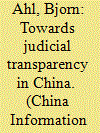| Srl | Item |
| 1 |
ID:
178236


|
|
|
|
|
| Summary/Abstract |
This article uses data gathered from a survey that probed the career orientations and values of more than 1,000 law students in Beijing, Hong Kong and Taipei to examine the legal professionalism of future lawyers being trained under different legal education systems in Greater China. Our findings suggest that these future lawyers have a “materialistic” career orientation, although those studying in a system whose legal education goal is to train professional lawyers are more inclined to pursue professional legal ideals, and those trained in a system that emphasizes legal ethics are more likely to pursue public interest issues. On the basis of the findings, we argue that legal education systems in Greater China, while different in their traditions, share the same need to strengthen legal professionalism by according greater emphasis to legal ethics in their respective law school curricula.
|
|
|
|
|
|
|
|
|
|
|
|
|
|
|
|
| 2 |
ID:
158260


|
|
|
|
|
| Summary/Abstract |
Since 2013 judicial reforms in China have intensified. While recent studies of the Chinese judiciary have focused on structural reforms concerning the jurisdiction of courts and internal court management, it has largely gone unnoticed that the Supreme People’s Court (SPC) has established an open-access database archiving the decisions of every court in China. On the basis of legal documents, secondary literature and interviews with experts, this study investigates the implications of the new database. We find that the database establishes new channels of communication that affect the relationship between the courts and the public, and the position of judges within the judiciary. Further, the open-access database facilitates changes in the structure of communication among legal experts, which in turn promotes legal professionalism. We argue that the SPC made use of the party policy on the direct accountability of the courts towards the people in order to pursue its institutional interest in a professional judiciary.
|
|
|
|
|
|
|
|
|
|
|
|
|
|
|
|